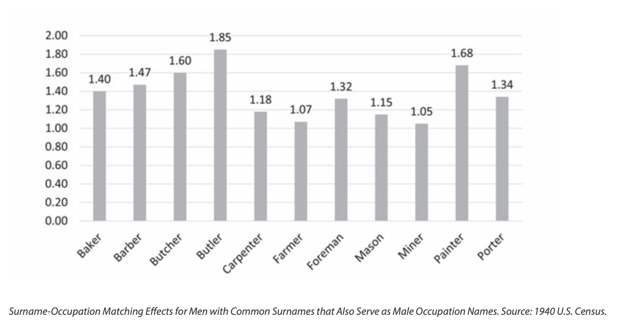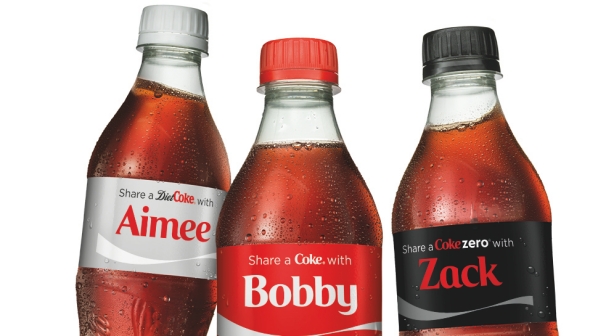What would you say if I told you that the 2019 International Tree Climbing champions were named Scott Forrest and Josephine Hedger? Or that Christopher Coke is a Jamaican drug lord? Or that Bernie Madoff indeed made off with a lot of people’s money? Coincidences... or something more?
The phenomenon of a person’s name describing their appearance, behaviors or accomplishments is called an aptronym. A few more modern day examples are the fastest man on Earth named Usain Bolt, New York television meteorologist, Amy Freeze and one particular former congressman forced to resign from office after tweeting pictures of his, ahem, well… you know.
But can names really influence who we become? While there are some who vehemently dispute any kind of scientific correlation between our names and our lives, there is evidence that our names have on our life choices and outcomes. Nominative determinism is the theory that we tend to gravitate towards occupations and lifestyles that fit our names. One explanation for nominative determinism is implicit egotism, which posits that we have an unconscious preference for things we associate with ourselves. For example, studies show we have an affinity for the letters that make up our name, particularly our initials.
It all started making waves in the research community back in 2002 with a study titled, “Why Susie Sells Seashells by the Seashore.” Researchers Pelham, Miremberg and Jones assessed the role of implicit egotism in 2 major life decisions: where people choose to live and what people choose to do for a living. They found a disproportionate number of Philips living in Philadelphia, Virginia’s in Virginia Beach and Jacks in Jacksonville. They also maintained that people with the names Dennis or Denise are over-represented among dentists, and hardware store owners were about 80% more likely to have names beginning with the letter H as compared with R while roofers showed the reverse pattern.
In 2010, this research was expanded to examine names specifically in the medical and legal professions. Using data from online directories, three studies of nominative determinism showed that Americans with the word ‘doctor’ as or in their surname were significantly more likely to be doctors than lawyers, whereas those with ‘lawyer’ as or in their surname were more likely to be lawyers than doctors.
After much criticism and debate about nominative determinism, Uri Simonsohn, a professor at the University of Pennsylvania’s Wharton School stepped into the field as a vocal opponent specifically to the original 2002 study that started the whole thing. Simonsohn replicated Pelham’s research in his own study and determined that any connections with names are most likely caused by a combination of cohort, geographic and ethnic confounds, and reverse causality.
In response to Simonsohn’s criticism, Pelham continued his research in 2015 using the 1940 US census records. He analyzed 11 major male occupations and found that for each occupation, men that had that name were overrepresented in that data. His data reflects that men overall were 15.5% more likely to work in occupations that bore their surname than they should have been based on chance and white men were about 30% more likely to work in an occupation whose title matched their surname. To be sure these findings were not an artifact of overzealous data fitting, they replicated them using both the 1880 US Census and the 1911 English Census.
 I know what you’re thinking… Because of the way names have historically been assigned to people based on their occupations, can’t one assume that a person has just inherited both his or her parent’s name and occupation? Pelham says that’s highly unlikely. “Even if you make the assumption that half the time men do exactly what their fathers did, the effect would be absolutely negligible,” he says.
I know what you’re thinking… Because of the way names have historically been assigned to people based on their occupations, can’t one assume that a person has just inherited both his or her parent’s name and occupation? Pelham says that’s highly unlikely. “Even if you make the assumption that half the time men do exactly what their fathers did, the effect would be absolutely negligible,” he says.
Also in 2015, four members of the same medical family expanded that research with a study titled ‘Nominative determinism in hospital medicine’ in search of surnames that matched the medical specialty or a medical term in general (e.g. a neurologist named Russell Brain or a physician’s assistant named Jenny Rounds). The researchers, C. Limb, R. Limb, C. Limb and D. Limb (nope – not even kidding) concluded that the frequency of names relevant to medicine was much greater than expected by chance. Furthermore, medical specialties with the largest proportion of relevant names were those focused on body parts with many alternative labels – inevitably, the genitals. For example, they found urologists named Dr Burns-Cox, Woodcock, Waterfall, and, my favorite, Dr Richard 'Dick' Chopp – an Austin, Texas urologist specializing in vasectomies until he retired in 2020. (In fairness, it’s more of a snip than a chop but still…)
There are countless examples of people who fit their names in modern-day culture. Tiger Woods, Scott Speed, Mary Berry and Tom Hanks’ sons named Colin and Chet.

The name Colin means victory. Colin Hanks is an American actor, producer, and director who looks like he's won the game of life.
The name Chet, on the other hand, is a shortened form of the name Chester which means "camp of soldiers." Chet Hank sports a number of tribal tattoos and has described himself as the black sheep of the family due to his struggles with substance abuse.
Because the link between name letters and our core identity is relatively arbitrary, we are able to associate ourselves with both positive and negative targets that share our letters. A University of Michigan study explored this concept within the context of major hurricane disasters. Researchers found that people who shared the initial with the hurricane name were overrepresented among relief donors. For example, people with names similar to ‘Katrina’ were far more likely to donate to Hurricane Katrina relief efforts.
In 2007, psychologists Leif Nelson and Joseph Simmons analyzed almost a century of baseball strikeouts and found that hitters with the initial K had a higher strikeout rate. They also found that college students with the initials C and D had a slightly lower grade point average than students with the initials A and B, and A and B applicants to law school were more likely to go to attend better universities.
The cocktail party effect is the phenomenon of the brain's ability to focus one's auditory attention on a particular stimulus while filtering out a range of other stimuli. For example, most of us have the uncanny ability to hear our own name above the noise of a busy party despite a loud humming of conversation. That is because our own name is more than just a word or sound – it’s a stimulus, trigger and determining factor of our core identity.
Now, I know there are two camps of folks reading this. There are those who find this interesting and fun – a gentle poke at a mental sweet spot wondering if all of these examples are coincidence or if there could be invisible force at work here. Then there are those are grimacing and maybe even cursing at me through their devices that this is all bunk – not science. That correlation is not causation and that every study out there is not automatically a contribution to science. If you are one of those people, then you’re not alone. But, before you get all twisted up, we do have empirical data that does show how others perceive us – through our appearance, education, and, yes, even our names – affects our lives. Perhaps we need more research about nominative determinism and implicit egotism. Until then, if it makes you think just a little and provokes an inspired conversation, that’s a win.
Learn more about the power of names in marketing!









